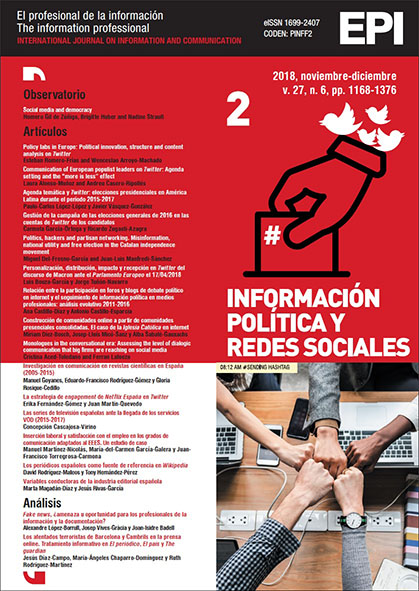Relación entre la participación en foros y blogs de debate político en internet y el seguimiento de información política en medios profesionales: análisis evolutivo 2011-2016
Resumen
Las facilidades que ofrece la tecnología hacen que muchas personas se conviertan en creadores de contenidos políticos en internet. Con frecuencia, esa producción no está sustentada en información elaborada por profesionales. El objetivo de este trabajo es analizar la asociación entre el seguimiento de información política en medios profesionales y la producción de contenidos políticos en medios no profesionales. El estudio realiza un análisis secundario de datos obtenidos de la aplicación del método estadístico a encuestas publicadas por el Centro de Investigaciones Sociológicas entre 2011 y 2016. Los resultados muestran que existe una sólida relación entre la participación en blogs y foros de debate político y el hecho de informarse sobre política a través de Internet. También se observa una asociación entre la creación de contenidos políticos y el seguimiento de programas sobre política a través de la prensa y de programas de radio y televisión.
Descargas
References
Anscombe, Frank (1973). "Graphs in statistical analysis". American statistician, v. 27, n. 1, pp. 17-21. http://www.sjsu.edu/faculty/gerstman/StatPrimer/anscombe1973.pdf
Anstead, Nick; O´Loughlin, Ben (2011). "The emerging viewertariat and BBC question time: Television debate and real-time commenting online". The international journal of press/politics, v. 16, n. 4, pp. 440-462. https://doi.org/10.1177/1940161211415519
Ardèvol-Abreu, Alberto; Barnidge, Matthew; Gil-de-Zúñiga, Homero (2017). "Communicative antecedents of political persuasion: Political discussion, citizen news creation, and the moderating role of strength of partisanship". Mass communication and society, v. 20, n. 2, pp. 169-191. https://doi.org/10.1080/15205436.2016.1244855
Casero-Ripollés, Andreu (2017). "Producing political content for web 2.0: Empowering citizens and vulnerable populations". El profesional de la información, v. 26, n. 1, pp. 13-19. https://doi.org/10.3145/epi.2017.ene.02
Cho, Jaeho; Shah, Dhavan; McLeod, Jack; McLeod, Douglas; Scholl, Rosanne; Gotlieb, Melissa (2009). "Campaigns, reflection, and deliberation: Advancing an O-S-R-O-R model of communication effects". Communication theory, v. 19, n. 1, pp. 66-88. https://doi.org/10.1111/j.1468-2885.2008.01333.x
Conover, Pamela; Searing, Donald; Crewe, Ivor (2002). "The deliberative potential of political discussion". British journal of political science, v. 32, pp. 21-62. https://doi.org/10.1017/S0007123402000029
Correa, Teresa (2010). "The participation divide among "˜online experts´: Experience, skills, and psychological factors as predictors of college students´ web content creation". Journal of computer-mediated communication, v. 16, n. 1, pp. 71-92. https://doi.org/10.1111/j.1083-6101.2010.01532.x
Cramér, Harald (1946). Mathematical methods of statistics. Princeton: Princeton University Press. ISBN: 978 0 691005478
Elin, Larry (2003). "The radicalization of Zeke Spier: How the Internet contributes to civic engagement and new forms of social capital". En: McCaughey, Martha; Ayers, Michael. Cyberactivism: Online activism in theory and practice. New York: Routledge, pp. 97-114. ISBN: 978 0 415943208
Gil-De-Zúñiga, Homero; Weeks, Brian; Ardèvol-Abreu, Alberto (2017). "Effects of the news-finds-me perception in communication: Social media use implications for news seeking and learning about politics". Journal of computer-mediated communication, v. 22, n. 3, pp. 105-123. https://doi.org/10.1111/jcc4.12185
Hargittai, Eszter; Walejko, Gina (2008). "The participation divide: Content creation and sharing in the digital age". Information, communication & society, v. 11, n. 2, pp. 239-256. https://doi.org/10.1080/13691180801946150
Huckfeldt, Robert; Sprague, John (1991). "Discussant effects on vote choice: Intimacy, structure, and interdependence". The journal of politics, v. 53, n. 1, pp. 122-158. https://doi.org/10.2307/2131724
Huckfeldt, Robert; Sprague, John (1995). Citizens, politics and social communication: Information and influence in an election campaign. New York: Cambridge University Press. ISBN: 978 0 521452984
Jones, Sydney; Fox, Susannah (2009). Generations online in 2009. Washington, DC: Pew Internet & American Life Project. http://www.pewinternet.org/2009/01/28/generations-online-in-2009
Kaufhold, Kelly; Valenzuela, Sebastián; Gil-de-Zúñiga, Homero (2010). "Citizen journalism and democracy: How user-generated news use relates to political knowledge and participation". Journalism and mass media communication quarterly, v. 87, n. 3/4, pp. 515-529. https://doi.org/10.1177/107769901008700305
Lenhart, Amanda; Horrigan, John; Fallows, Deborah (2004). Content creation online. Washington, DC: Pew Internet and American Life Project. http://www.pewinternet.org/2004/02/29/content-creation-online
Moeller, Judith; De-Vreese, Claes; Esser, Frank; Kunz, Ruth (2014). "Pathway to political participation: The influence of online and offline news media on internal efficacy and turnout of first-time voters". American behavioral scientist, v. 58, pp. 689-700. https://doi.org/10.1177/0002764213515220
Mondak, Jeffery (2010). Personality and the foundations of political behavior. New York: Cambridge University Press. ISBN: 978 0 521140959
Shehata, Adam; Hopmann, David; Nord, Lars; Hí¶ijer, Jonas (2015). "Television channel content profiles and differential knowledge growth: A test of the inadvertent learning hypothesis using panel data". Political communication, v. 32, n. 3, pp. 377-395. https://doi.org/10.1080/10584609.2014.955223
Shirky, Clay (2011). "The political power of social media". Foreign affairs, v. 90, n. 1, pp. 28-41. http://www.cc.gatech.edu/~beki/cs4001/Shirky.pdf
Tewksbury, David; Weaver, Andrew; Maddex, Brett (2001). "Accidentally informed: Incidental news exposure on the world wide web". Journalism & mass communication quarterly, v. 78, n. 3, pp. 533-554. https://doi.org/10.1177/107769900107800309
Thorson, Emily (2012). "Beyond opinion leaders: How attempts to persuade foster political awareness and campaign learning". Communication research, v. 41, n. 3, pp. 353-374. https://doi.org/10.1177/0093650212443824
Van-Dijck, Jose (2013). The culture of connectivity: A critical history of social media. Oxford: Oxford University Press. ISBN: 978 0 199970780
Downloads
Publicado
Número
Sección
License
Condiciones de difusión de los artículos una vez son publicados
Los autores pueden publicitar libremente sus artículos en webs, redes sociales y repositorios
Deberán respetarse sin embargo, las siguientes condiciones:
- Solo deberá hacerse pública la versión editorial. Rogamos que no se publiquen preprints, postprints o pruebas de imprenta.
- Junto con esa copia ha de incluirse una mención específica de la publicación en la que ha aparecido el texto, añadiendo además un enlace clicable a la URL: http://revista.profesionaldelainformacion.com
La revista Profesional de la información ofrece los artículos en acceso abierto con una licencia Creative Commons BY.





